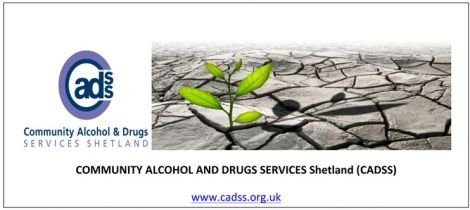News / Blame the culture, not the youths
HARD drug use amongst youths in Shetland is on the decrease, but alcohol is becoming more and more of a problem, according to the local drugs and alcohol support service.
Community Alcohol & Drugs Services Shetland staff say the growth in young people drinking too much is partly down to attitudes across Shetland and Scotland.
Their comments come as the Scottish government releases figures showing that one in 10 children in Scotland are affected by their parents’ alcohol misuse.
The CADSS surveys in Shetland schools show that not only is drinking on the rise, but that young people have started taking alcohol earlier in their lives over the past five years.
They also show most young people who tried illicit drugs were under the influence of alcohol at the time, suggesting how alcohol can lead to harder drugs.
Senior CADSS worker Amanda Pearson said there were often complex reasons behind people becoming involved in drugs and alcohol, but culture had a lot to do with it.
“If we have a culture of excessive alcohol use and young people are seeing the attitude towards alcohol within the culture in which they live is excessive, then if you put any substance into their lives, the same behaviour would apply,” she said.
“So if the drug using culture is an excessive culture, then all drug use within that culture will normally be excessive.
“People learn from the culture in which they are living in. The relationship we have in Scotland and Shetland with alcohol does have an effect on the behaviour within sub-cultures of drug users.”
CADSS young persons worker Jenny Gilmour believes one reason could be young people hanging around with older youths.
“A good few years ago you used to keep to your age peer group – if you were, say, 14 or 15, you’d stay around that age group – but now, a lot of young people are associating with a lot older, which gives them access to alcohol and some harder drugs,” she said.
Become a member of Shetland News
Meanwhile drug and alcohol education is thought to be improving across the islands.
When Gilmour started her current job seven and a half years ago she spoke exclusively about alcohol to S2 and S5 pupils. This has since expanded to S1-5 talks on alcohol and drugs, working in youth clubs, parent information evenings and more.
“I’m more accessible for young people now, and it’s not such a taboo subject as what it used to be,” she said.
The government’s stance on drug education has also improved significantly since the Just Say No campaign of the 1980s.
Pearson said: “It was too simplistic really. Certainly what the government, to my understanding, is looking at now is informing young people and the general public about the risks involved in the use of illicit substances so people can make an informed choice, and hopefully deter people from using.”
She said what was needed was a change in the culture surrounding alcohol in Scotland and Shetland, and government and the local council were helping on this front.
“Everybody is looking at how we can continue to change the culture and attitude towards alcohol into a more positive thing.”
CADSS is an independent voluntary service in Shetland. Jenny Gilmour works with young people of generally 15-17 years old to help with the effects of their own or someone else’s drug use. She is available for more information or help on 01595 698913 or jenny@cadss.org.uk
Iwan MacBride
Become a member of Shetland News
Shetland News is asking its many readers to consider paying for membership to get additional features and services: -
- Remove non-local ads;
- Bookmark posts to read later;
- Exclusive curated weekly newsletter;
- Hide membership messages;
- Comments open for discussion.
If you appreciate what we do and feel strongly about impartial local journalism, then please become a member of Shetland News by either making a single payment, or setting up a monthly, quarterly or yearly subscription.





























































